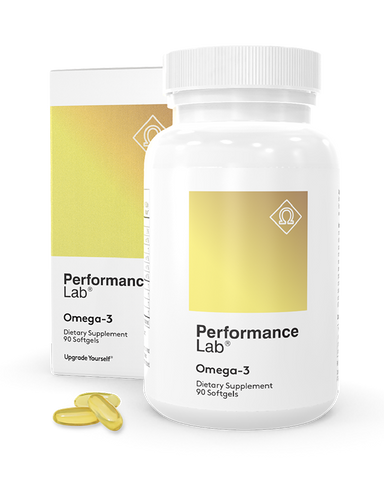Key Takeaways
- Women need omega-3s for many reasons, from hormone balance and menstrual comfort to brain, heart, joint, and eye health.
- EPA and DHA can help ease menstrual cramps, support mood and cognitive function, and protect long-term cardiovascular health.
- Omega-3 intake is especially important during key life stages like pregnancy, postpartum, and menopause, when demands on the body change.
- Because modern diets skew heavily toward inflammatory omega-6 fats, a high-quality omega-3 supplement is a simple way to restore a healthier balance.

Let's be real about this one: it's not just women who need omega-3s in their diet, it's everyone.
But there are a few reasons that are specific to women that unfortunately aren't that applicable to men.
And remember that when we say omega 3s, we're not referring to the plant-based ALA, but EPA and DHA—the most biologically active omega-3 fatty acids.
Luckily for you, the best Omega-3 supplements on the market include these fatty acids on its ingredients list.
But with no further ado, here are five reasons every female needs omega-3s in their diet:
#1: Relieve Menstrual Symptoms
If you're one of those women that are curled up on the floor crying in pain from cramps that even the strongest of pain killers won't help, adding an omega-3 supplement to your diet may be to your benefit.
The anti-inflammatory property of omega-3 fatty acids makes them a lifesaver during your period.
Omega-3 fatty acids have been shown to have immunomodulatory effects and decrease levels of CRP, TNF-α, IL-6, and IL-1—all markers of inflammation 1.
And if you need more convincing, some research suggests that omega-3 supplements can be just as effective, if not more, than ibuprofen at relieving pain associated with menstruation 2.
#2: An Essential Part of Pregnancy
Whether you're currently pregnant or planning to be in the future, an omega-3 supplement is something you'll want.
Just like adults, omega-3 fatty acids are critical building blocks of the fetal brain and retina 3.
And it's likely that requirements for omega-3s increase during pregnancy, so even if you are consuming a diet rich in food sources of omega-3, it's always a good idea to bump up and supplement.
However, because seafood is often full of heavy metals and other contaminants toxic to both the mother and fetus, fish consumption should be limited unless it's coming from a clean, sustainable source.
Not only this, but omega-3s are essential to a full-term pregnancy.
An elevated ratio of omega-6 to omega-3 fatty acids increases the production of pro-inflammatory molecules called eicosanoids, specifically PGE2 and PGF2α, which have been associated with premature labor 4.
A deficiency of omega-3s during pregnancy has also been associated with visual and behavioral deficits that cannot be reversed with postnatal supplementation 3.

An omega-3 supplement like Performance Lab Omega 3 is one of the cleanest, safest omega-3 supplements on the market.
It skips all the adverse side effects of conventional fish oil supplements and instead is derived from non-GMO algae, containing no toxins or harsh contaminants.
It's also guaranteed environmentally friendly and sustainable, making it the ideal option for pregnancy.
#3: Boost Heart Health
Because of their potent anti-inflammatory properties, omega-3s play an essential role in protecting your body against cardiovascular disease.
Omega-3 fatty acids can change the synthesis and release of eicosanoids (thromboxanes, leukotrienes, etc.).
This leads to lower levels of inflammation, which may help to reduce vascular atherogenic inflammation 5.
Other research suggests that omega-3 fatty acids may also improve endothelial function by promoting the release of nitric oxide from endothelial cells, which helps to increase blood flow and lower blood pressure 6.
Taking this further, they may also help to reduce systolic and diastolic blood pressure due to their presence and incorporation into membrane phospholipids, which increase membrane fluidity.
Also, it's been well established that omega-3 fatty acids help to reduce serum triglycerides, which may be in part due to decreased hepatic synthesis of VLDL, but also by boosting the breakdown of fatty acids and increase clearance of triglycerides 5.
#4: Maintain Cognitive Function
We've talked about the importance of omega-3 fatty acids for brain health, but we'll do it one more time for good measure.
And as you know by now, the brain largely consists of fat—it's actually the fattiest organ in your body, which means to support optimal function, it needs fat.
And that comes from omega-3s.
Arachidonic acid (AA) and DHA are the two most abundant fatty acids in the brain, with DHA being taken up preferentially.
Adequate intake of both EPA and DHA, however, has been shown to be neuroprotective, helping to prevent against learning and memory impairments, as well as inflammation 7.
Interestingly enough, endogenous synthesis of EPA and DHA within the brain are low compared with rates of uptake from the fatty acid pool, suggesting that optimal levels are maintained dietary uptake 7.
Why is cognitive health so important for women? Research shows that women are at a significantly greater risk of developing Alzheimer's compared to men.
One plausible hypothesis for this is that men may have a greater cognitive reserve, meaning the amount of brain damage that can be tolerated before reaching a clinical threshold for impairment 8.
So, get started on your supplement ASAP!
#5: Reduce the Risk of Osteoporosis
As women, certain things are inevitable at some point in our life—menopause being one of them.
And as we roll into menopause, estrogen levels start to decline, which means we're more susceptible to developing osteoporosis if bone health isn't maintained.
Estrogen plays a vital role in regulating and promoting activity of osteoblasts, the cells that build up bones, while low estrogen is associated with large increases in bone resorption caused by an increase in osteoclast numbers and activity; osteoclasts are the cells responsible for breaking down bone 9.
Pro-inflammatory cytokines like IL-6, TNF-α, and PGE2 are also responsible for increasing bone resorption but are downregulated by the presence of estrogen.
But in the interest of omega-3 supplementation, studies show that omega-3s, especially DHA, are linked to improved bone mineral density.
This is thought to be due to the role of omega-3s in regulating bone metabolism; they appear to decrease the release of prostaglandin E2 (PGE2), as well as one of the most important factors in osteoclast differentiation, receptor-activated nuclear kappa-β ligand (RANKL).
Omega-3s may also modulate other pro-inflammatory cytokines and improve calcium accumulation in bone 10.
References
- TC Adarme-Vega, DK Lim, M Timmins, F Vernen, Y Li, PM Schenk. Microalgal biofactories: a promising approach towards sustainable omega-3 fatty acid production. Microb Cell Fact. 2012; 11: 96.
- M Zafari, F Behmanes, A Agha Mohammadi. Comparison of the effect of fish oil and ibuprofen on treatment of severe pain in primary dysmenorrhea. Caspian J Intern Med. 2011; 2(3): 279-282.
- JM Coletta, SJ Bell, AS Roman. Omega-3 Fatty acids and pregnancy. Rev Obstet Gynecol. 2010; 3(4): 163-171.
- AS Roman, J Schreher, AP Mackenzie, PW Nathanielsz. Omega-3 fatty acids and decidual cell prostaglandin production in response to the inflammatory cytokine IL-1beta. Am J Obstet Gynecol. 2006 Dec; 195(6): 1693-9.
- A Mohebi-Nejad, B Bikdeli. Omega-3 supplements and cardiovascular diseases. Tanaffos. 2014; 13(1): 6-14.
- M Massaro, E Scoditti, MA Carluccio, R De Caterina. Basic mechanisms behind the effects of n-3 fatty acids on cardiovascular disease. Prostaglandins Leukot Essent Fatty Acids. 2008 Sep-Nov; 79(3-5): 109-15.
- SC Dyall. Long-chain omega-3 fatty acids and the brain: a review of the independent and shared effects of EPA, DPA and DHA. Front Aging Neurosci. 2015; 7: 52.
- KR Laws, K Irvine, TM Gale. Sex differences in cognitive impairment in Alzheimer's disease. World J Psychiatry. 2016; 6(1): 54-65.
- BL Riggs. The mechanisms of estrogen regulation of bone resorption. J Clin Invest. 2000; 106(10): 1203-1204.
- N Kajarabille, J Díaz-Castro, S Hirano, M López-Frías, I López-Aliaga, JJ Ochoa. A new insight to bone turnover: role of ω-3 polyunsaturated fatty acids. Scientific World Journal. 2013 Nov.
















